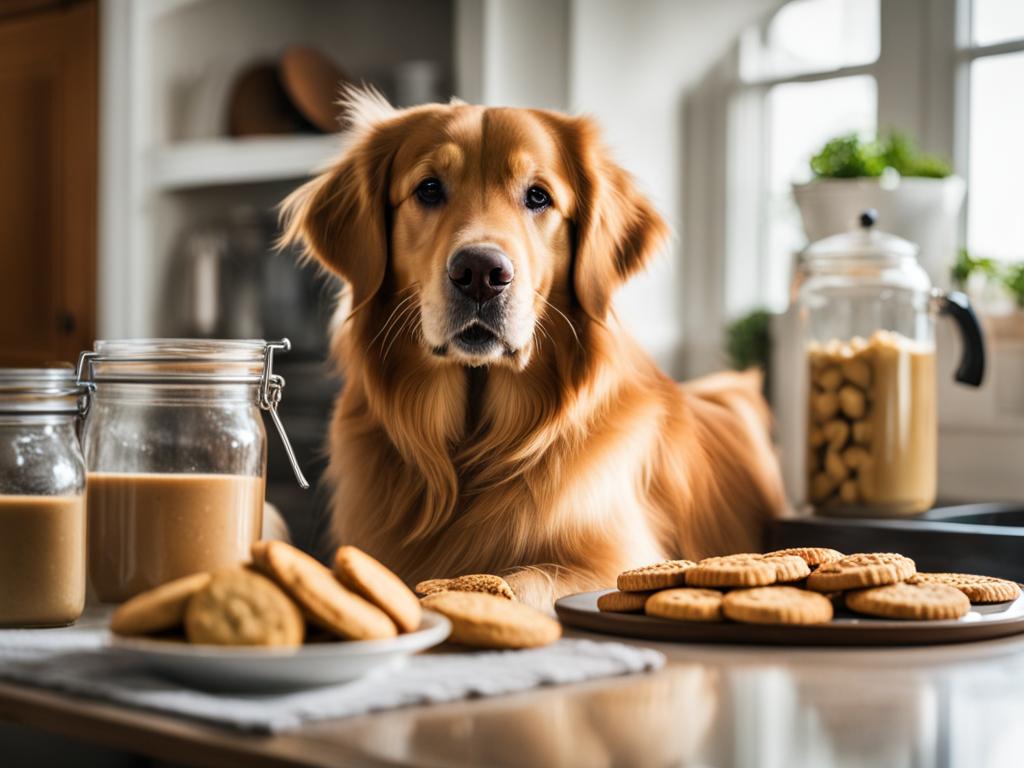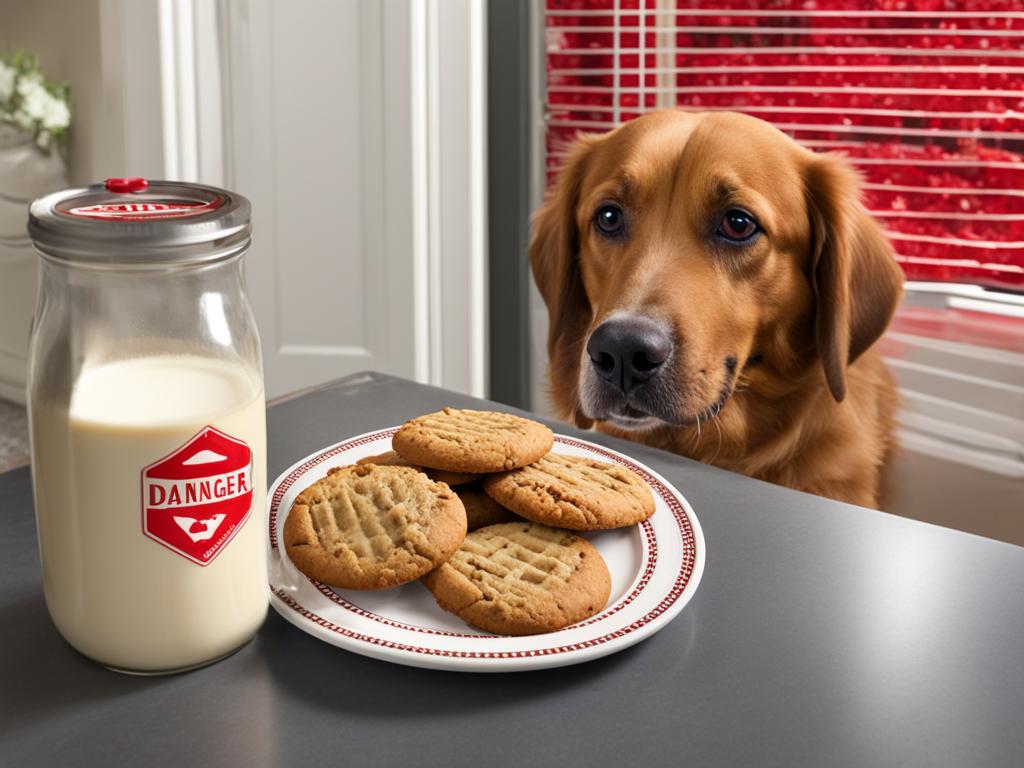According to veterinary experts, dogs can eat peanut butter in moderation. It has several nutritional benefits and can be a healthy treat for them. However, when it comes to peanut butter cookies, there are a few things pet owners need to consider. It is essential to ensure that the cookies do not contain any harmful ingredients like xylitol, chocolate, or excessive sugar. Additionally, portion control is crucial as too much fat from the cookies can lead to gastrointestinal issues in dogs. Homemade peanut butter cookies with simple, dog-friendly ingredients can be safer for treating your furry friend.
Key Takeaways:
- Dogs can eat peanut butter in moderation, but peanut butter cookies may not be safe.
- Avoid peanut butter cookies with harmful ingredients like xylitol, chocolate, or excessive sugar.
- Portion control is essential to prevent gastrointestinal issues in dogs.
- Consider making homemade peanut butter cookies with dog-friendly ingredients.
- Consult with your veterinarian for appropriate portion sizes and dog treat frequency.
Health Benefits of Peanut Butter for Dogs
Peanut butter can be a nutritious addition to your dog’s diet. It provides several health benefits and can be a tasty treat for your furry friend. Here are some of the critical advantages of feeding peanut butter to dogs:
- Source of Protein: Peanut butter is rich in protein, essential for building and repairing dog tissues. It helps maintain strong muscles and supports their overall growth and development.
- Healthy Fats: Peanut butter contains healthy fats, such as monounsaturated and polyunsaturated fats, contributing to your dog’s well-being. These fats aid nutrient absorption, support a healthy coat and skin, and provide a sustainable energy source.
- Vitamins and Nutrients: Peanut butter is packed with beneficial vitamins and nutrients for dogs. It contains vitamin B6, which aids in brain function and the production of red blood cells. Niacin helps with enzyme function and supports a healthy nervous system. Vitamin E is an antioxidant that contributes to a robust immune system.
- Glucose Generation: Peanut butter provides a natural glucose source, an essential component for energy production in dogs. It helps fuel their daily activities and supports their overall stamina and well-being.
- Immune Support: The nutrients found in peanut butter, including vitamin E and niacin, help boost your dog’s immune system. A robust immune system is crucial for fighting infections and diseases and keeping your pet healthy and happy.
Recommended Serving Size
While peanut butter offers several health benefits for dogs, feeding it in moderation is essential. Peanut butter is high in calories, and excessive consumption can lead to weight gain and potential health issues. The recommended serving size for dogs depends on their size and activity level.
| Dog Size | Recommended Peanut Butter Serving Size |
|---|---|
| Small (up to 20 lbs) | 1 teaspoon-1 tablespoon |
| Medium (20-50 lbs) | 1-2 tablespoons |
| Large (50-90 lbs) | 2-3 tablespoons |
| Extra Large (90+ lbs) | 3-4 tablespoons |
Remember to factor in the calories from peanut butter into your dog’s overall daily calorie intake to maintain a balanced diet.
Risks of Feeding Peanut Butter Cookies to Dogs
Although dogs can consume peanut butter, it’s essential to be cautious when feeding them peanut butter cookies made for humans. These cookies often contain ingredients that can be harmful to dogs and pose potential risks to their health.
Ingredients in Peanut Butter Cookies That Are Bad for Dogs
The ingredients commonly found in peanut butter cookies, such as wheat or enriched flour, sugar, xylitol, and sometimes chocolate, can negatively affect dogs.
1. Wheat or Enriched Flour: Wheat or enriched flour is a high-carbohydrate grain that is not necessary or healthy for dogs. While it may not necessarily be toxic, it offers no nutritional benefits to them.
2. Sugar: Sugar, a common ingredient in peanut butter cookies, can lead to various health issues in dogs. Excessive sugar consumption can contribute to obesity and dental problems. Moreover, it can increase the risk of developing diabetes in dogs.
3. Xylitol: Xylitol, a sweetener in some peanut butter cookies, is highly toxic to dogs. Even a tiny amount can cause a rapid release of insulin in their bodies, which can lead to dangerously low blood sugar levels, liver failure, and even death.
4. Chocolate: Chocolate contains theobromine, a toxic substance to dogs. Ingesting chocolate, especially in high quantities or dark chocolate, can result in symptoms ranging from mild gastrointestinal upset to more severe conditions like vomiting, diarrhea, rapid breathing, irregular heart rhythm, seizures, and even death. Therefore, it is crucial to avoid giving dogs any form of chocolate, including chocolate-flavored cookies.
Peanut Allergies in Dogs
While peanut allergies in dogs are relatively rare, some dogs may be allergic or hypersensitive to peanuts. Allergic reactions can manifest as itching, hives, swelling, vomiting, diarrhea, and difficulty breathing. If you suspect that your dog has a peanut allergy, it is best to consult a veterinarian for proper diagnosis and guidance.
Peanut Butter Cookies and Dogs’ Weight
Feeding peanut butter cookies to dogs, especially those made for humans, can contribute to weight gain and obesity. These cookies are often high in calories and fat, leading to excessive weight gain if consumed regularly or in large quantities.
Excess weight in dogs can lead to various health problems, including joint pain, decreased mobility, heart disease, diabetes, and a shorter lifespan. Monitoring your dog’s weight and ensuring they receive a balanced and appropriate diet to maintain their overall health and well-being is essential.
To ensure the safety of your furry friend, it is crucial to check the ingredients of peanut butter cookies before sharing them with your dog. Homemade treats using dog-friendly ingredients or specially formulated dog treats are a safer and healthier alternative. Always consult your veterinarian to determine the appropriate portion size and frequency of treats for your dog’s specific needs.
Also read a separate guide if you want to offer Rambutan , Shrimp , Okra and potatoes to your dogs.
Conclusion
In conclusion, dogs can enjoy peanut butter as part of their diet. However, it’s essential to be cautious about peanut butter cookies. Peanut butter cookies made for humans may contain ingredients harmful to dogs, such as xylitol, chocolate, and excessive sugar.
If you want to treat your furry friend with peanut butter cookies, opting for homemade recipes is best. By making dog-friendly peanut butter cookies, you can control the ingredients and ensure they are safe for canine consumption.
Always consult with your veterinarian to determine the appropriate portion size and frequency of treats for your dog. Prioritize their health and well-being by providing them with homemade dog treats that are free from harmful additives. With creativity and love, you can make delicious peanut butter cookies that you and your dog will enjoy!



